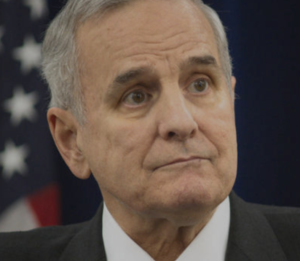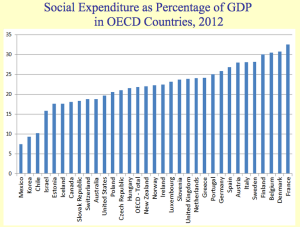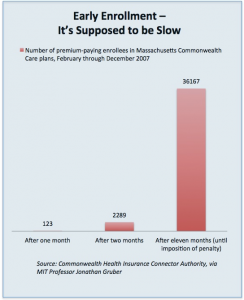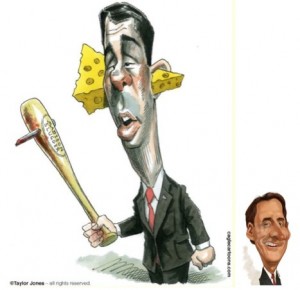 Ok, I admit it. I was rooting for Donald Trump last night. Not because I think he has a clue about anything relevant to you and me. But simply, purely, because as long as he holds center stage he guarantees the belittling light of farce will remain fixed on the entire Republican field. Without him more people might be tempted to take the likes of Scott Walker seriously, to name only one prime example.
Ok, I admit it. I was rooting for Donald Trump last night. Not because I think he has a clue about anything relevant to you and me. But simply, purely, because as long as he holds center stage he guarantees the belittling light of farce will remain fixed on the entire Republican field. Without him more people might be tempted to take the likes of Scott Walker seriously, to name only one prime example.
When the debate wrapped last night and the Dramamine began wearing off — no point risking stomach distress from the whiplashing motion sickness in the white caps of so much illogic and shameless bullshit — I clicked over to the liberal enclave, MSNBC, for their take on the circus.
First came Chris Matthews, wetting himself over the performance of … Marco Rubio (!?). Then came Chuck Todd with his focus on FoxNews’ opening salvo — asking for a show of hands on who would abide by the party’s eventual nominee and then Megyn Kelly’s long question/indictment of Trump’s catty shots against women over the years — both clearly designed to knock The Donald, no friend of Rupert Murdoch, back on his heels at the get-go.
Trump, a creature of show biz catfighting, gave as he got and I strongly suspect rose today at least as strong as he was before the curtain rose last night. Why? Because his “people” don’t give a damn about “political correctness”, as he argued. Nor do they care all that much about gay marriage or immigration or the Iran deal, or any of the other alleged hot button issues touted by the political class. Mainly, Trump’s people are just pissed off, pretty much at everyone, on the not exactly deeply-examined grounds that “those people” have been screwing them over and are responsible for the condition of their lives.
Of course there’s no logic to their embrace of a ravenous, self-serving billionaire who plainly doesn’t know a thing about foreign relations, national security or public policy. But logic has very little role this early in any election season and almost none at any time in the modern conservative freak show of vanity candidates.
I seriously doubt your average Trump supporter believes for a second he’ll win anything. ot thNe nomination, much less the presidency. All they want for the time being is an entertaining performer who makes the other guys (and gal) look like the scripted stiffs they are.
The night before the debate I had a long happy hour with former right-wing talk show host Jason Lewis. (There’ll be a Q&A with him on MinnPost.com in the next couple weeks.) Over the course of three hours Lewis did say one interesting thing. (That’s a joke.) And that was that Trump’s immunity to criticism has everything to do with the fact that his demeanor powerfully conveys the attitude, “I don’t need this.” He may want it, like another gilded trophy (or wife). But “need it”? No. Certainly not in the sweaty, grasping, cringe-inducing way of a Rick Santorum, Chris Christie or Mike Huckabee? No way. Not even in the cynically calculating way of a life-long lapper at the taxpayer teat like Scott Walker. Lacking desperation, he exudes a scent of confidence the others can only fake.
The “I hate them all, because they’ve done nothing for me” crowd likes and admires and wishes they were a guy who could say, “Take this job and shove it” … and then fly their private jet back to their “classy” Palm Beach mansion. That crowd’s nihilistic fantasy is that Trump or the next guy/woman like him, will torch the system and, if nothing else, bring all the elitist douche bags down to their forced-to-shop-at-WalMart level. (And yes, do note the irony in that “elitist DB” business.)
But don’t take any of this from me. My assessment of winners and losers last night, Trump aside, was that … Rand Paul and John Kasich stood out, in a positive way.
Paul of course suffers from the same pathology as his father, Ron. Namely, the “Five Minute Rule” as the great Charles Pierce describes it. Both Pauls start in on some topic, usually military adventurism, and you’re thinking, “That makes sense. This guy isn’t quite the whack job I thought he was.” But then, almost exactly at the five-minute mark, just when you’re this close to buying into the hype that these guys are on to something they turn and take a headfirst dive into a 20-foot tub of Libertarian bat guano.
Like this one: ” ‘I think you don’t have a right to happiness — you have the right to the pursuit of happiness’, Paul, an ophthalmologist, said in a 2009 Kentucky town hall meeting. ‘[I]f you think you have the right to health care, you are saying basically that I am your slave. I provide health care. … My staff and technicians provide it. … If you have a right to health care, then you have a right to their labor’.”
WTF?
Kasich, despite the wooze-inducing claim that he was responsible for the Clinton economy of the 1990s, at least came across as a guy with touch of authentic empathy for the 47% crowd.
Ben Carson looked and sounded like a stand-in for a real candidate, like those seat-fillers they have at the Academy Awards show who zoom in when the stars have to take a potty break. Mike Huckabee, “a loser”, as Trump would say, with “no chance” seemed angrier than usual, and no more coherent. Ted Cruz was pretty much overlooked and typically tedious when he did speak, basically echoing the party line that his plan for America is to: A: Repeal everything Barack Obama has touched, and B: Head back over to the Middle East and really kick some towelhead ass this time. Because, you know, it worked out so well when Dick and W* did it.
Jeb Bush, the scion, brother-of and presumptive candidate once Trump flames out or goes independent rogue, came off like a sheet of taupe wallpaper. Like a bond salesman terrified he’ll say the one wrong thing that’ll scotch the deal, which in this case is his entitlement to the job. Beyond that, I’m sure there are millions of Floridians who had no idea Jebbie had transformed their pestilential wonderland of causeway McMansions and meth-head rednecks hiding under double-wides into a goddam Utopia of freedom and gummint service.
Chris Christie? Please. Rubio? Slick, telegenic as hell and as vacuous as a Fox & Friends host. And my boy Scott Walker? A guy who makes me worry because of the profound, visceral, rabid skunk-in-the-backyard repulsion I have for him? Even in this crowd he stands out if the contest is for the most smug and practiced liar. Hell, I’m still cleaning up the mess that shot out my nose when he declared he had balanced Wisconsin’s budget. You know, the one with the $2 billion deficit?
But as raw entertainment? As a combination of non-sequiturs, magical thinking, fear-mongering, denial and misdirection? Great stuff! Two thumbs, way up! Show biz gold, baby!
And really classy.
 As we count down Mark Dayton’s final days as Governor of Minnesota, it’s worth reflecting on one of the more peculiar figures in recent Minnesota political history.
As we count down Mark Dayton’s final days as Governor of Minnesota, it’s worth reflecting on one of the more peculiar figures in recent Minnesota political history.
 If United Airlines doesn’t pay out a fat chunk of change to the guy dragged off that plane in Chicago and roughed up by O’Hare airport cops we’ll know America has reached a point of apocalyptic decline. I mean, in the country I grew up in anyone could sue anyone for anything and often collect. And that was before everyone around them had a movie camera in their pocket recording their senseless beat down.
If United Airlines doesn’t pay out a fat chunk of change to the guy dragged off that plane in Chicago and roughed up by O’Hare airport cops we’ll know America has reached a point of apocalyptic decline. I mean, in the country I grew up in anyone could sue anyone for anything and often collect. And that was before everyone around them had a movie camera in their pocket recording their senseless beat down.
 Here’s why: Walker’s logic path quickly collapses as soon as you start connecting the dots.
Here’s why: Walker’s logic path quickly collapses as soon as you start connecting the dots. High as a kite from these clippings and the vindication they represent, DFLers run the risk of over-stepping, of pushing Minnesotans further than it they are comfortable going. As much as DFL politicians fantasize about bringing the social welfare
High as a kite from these clippings and the vindication they represent, DFLers run the risk of over-stepping, of pushing Minnesotans further than it they are comfortable going. As much as DFL politicians fantasize about bringing the social welfare 



